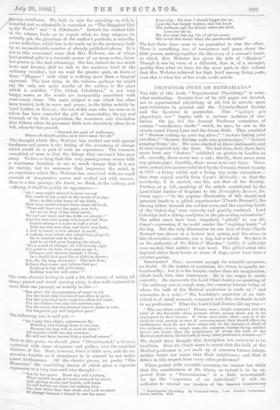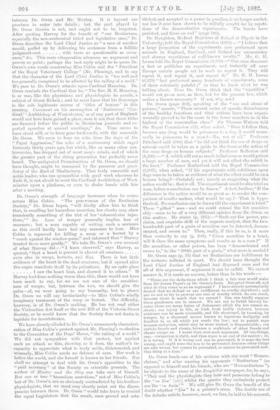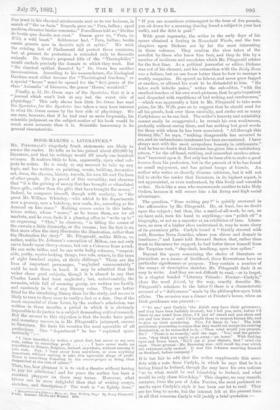PROFESSOR OWEN ON BESTIARIANS.* Tn s title of this book,
"Experimental Physiology," is sonic- what misleading. Seventy-four of its 216 pages are devoted, not to experimental physiology at all, but to attacks upon anti-vivisectors in general, and the Victoria-Street Society
and. the Spectator in particular. This "apologia Pro physiologic& sea" begins with a curious instance of con- fusion. On pp. 2-3 the learned Professor complains of certain "mendacious daubs" which, he says, he saw in the streets round Drury Lane and the Seven Dials. They consisted of "Doctors cutting up your dog alive ;" "doctors baking your cat alive ;" "doctors driving nails into gninea-pigs;" "doctors gouging frogs," Sic. We were startled at these statements, and at once inquired into the facts. We find that, first, there have never been any " doctors " exhibited on posters in London at, all; secondly, there never was a eat ; thirdly, there never were any guinea-pigs; fourthly, there never were any frogs. There were, indeed, two posters exhibited by the Victoria-Street Society in 1877—a living rabbit and a living dog under vivisection— they were copied exactly from °you's Hetlzodile; so that the mendacity, if it existed, was his, not that of the Society. Further, at p. l07, speaking of the article contributed by the Lord Chief Justice of England to the Fortnightly _Review, Dr. Owen says :—" In the popular illustration of this stupid and ignorant insult to a gifted experimenter [Claude Bernard], the blazing billets beneath the red-hot oven, and the expiring howls of the baked dog' were coarsely and gaudily rendered. Lord Coleridge had a fitting coadjutor in the pla.carding caricaturist.' The artist must have been singularly "gifted," to use Dr. Owen's expression, if he could render the "expiring howls of the dog. But the only illustration we can hear of from Claude Bernard was shown at a lecture last spring, and the stove, in. this illustration, contains, not a dog, but a rabbit. We have it. on the authority of Dr. Klein (" Minutes," 3,603), if authority were needed, that rabbits do not howl. The gifted artist who. depicted either their howls or those of dogs, must have been a. creative genius.
Inaccurate P Nay ; accurate enough for scientific purposes, no doubt. In the matter of quotation, Dr. Owen is equally un- trustworthy; but it is his temper, rather than his imagination, which leads him into ina.ccaracy. He is too angry to quote. correctly. He represents the Lord Chief Justice as speaking of "the ordinary coarse, rough man, the common human being, of whom the bulk of the Medical profession is made up ;" and comments in a note,—" His Lordship's aspersion of an indi- vidual is of small moment, compared with this wholesale insult to my profession." What the Lord Chief Justice did say was ::--- "Who are these writers ? Chosen men ; bright examples (we are told) of the Scientific class, persons whose names alone are to be arguments in their favour. If these men write thus—end -it is in- credible that, merely as men of common-sense, they should affect an indifference they do not feel—what will be the temper of mind of the ordinary, coals°, rough man, the common human being, neither better nor worse than his neighbours, of whom the bulk of the Medical profession, like the bulk of every other profession, is made up ?" We shonld have thought this description too universal to be insulting. Does Dr. Owen mean to assert that the bulk of the- Medical profession is not made up of common human beings, neither better nor worse than their neighbours; and that it, differs in this respect from every other profession I)
When quoted with scientific accuracy, we cannot but think that the sensitiveness of Dr. Owen, as indeed is to be ex- pected from a "humanitarian," is a little overstrained. . As for the " aspersion of an individual," it will be sufficient to remind our readers of the famous controversy
* Experimental Physiology. By Profeesor Owen. 1 vol. London Longmane. Green, and Co. 1882.
between Dr. Owen and Mr. Huxley. It is beyond our province to enter into details ; but the part played by Dr. Owen therein is not, and ought not to be, forgotten. After quoting Harvey for the benefit of "our Bestiarians, especially the non-anatomical titled and legislative ones," Dr. Owen describes the Lord Chief Justice as "a man of another mould, puffed up by delivering his sentences from a fallible
judgment-seat with taste as questionable as rever- ence," &c. This mere vituperation advances no argument and proves no point; perhaps tho best reply might be to quote Dr. Owen's own words concerning Miss Cobbe and the "President of the Royal Veterinary College" (Mr. Fleming), and to say that the character of the Lord Chief Justice is "too well and too generally recognised to be affected by the railing of a scold." We pass to Dr. Owen's attacks upon Cardinal Manning. Dr. Owen reminds the Cardinal that he, "The Rev. H. E. Manning, is or was, like the physicians and physiologists he assails, a subject of Great Britain ; and he must know that his Sovereign is the sole legitimate source of titles of honour' in this country. Comment on his assumption of Eminence," Car- dinal," Archbishop of Westminster,' or of any part of England. would not here have gained a place, were it not that these titles are flaunted before the public in Bestia.rian journals and re- ported speeches at annual meetings," &c. Time seems to have stood still, or to have gone backwards, with the venerable Dr. Owen. We seem to hear an echo from the days of the "Papal Aggression," the echo of a controversy which raged furiously thirty years ago, but which, like so many other con- troversies, has dropped out of most men's minds, and of which the greater part of the rising generation has probably never heard. The antiquated Protestantism. of Dr. Owen, we should have thought, might be reassured by the presence and presi- dency of the Earl of Shaftesbury. That truly venerable and noble leader, who can sympathise with good work wherever he finds it, is not afraid to meet the Cardinal Archbishop of West- minster upon a platform, or even to shake hands with him after a meeting.
Dr. Owen's strength of language increases when he comes across Mies Cobbe, " The pen-woman of the Bestiarian Society," Dr. Owen hopes, " will kindly allow him to think that, in recalling her hazardous assertion, her cheeks may show transiently something of the tint of her coloured-size injec- tions,'" &c. Loss of temper generally implies loss of manners; but a man capable of writing such a sentence 9 this could hardly have had any manners to lose. Miss Cobbe is reproved for killing a wasp or a hornet by a "crush against the window-pane," and informed that " Harvey treated them more gently." We take Dr. Owen's own account .of what Harvey did :—" I have observed," says Harvey, as
quoted, "that a heart is present in almost all creatures even also in wasps, hornets, and flies. There is but little evidence of the heart in the dead creatures, but if opened alive the organ manifests itself by its pulsations. By an optic glass I saw the heart beat, and showed it to others." If Harvey had clone nothing worse than this, there would not have been much to say, for we are not sure of the sensitive- ness of wasps ; but, between the two, we should give the palm—of, we were going to say humanity, but to please Dr. Owen we will say bestiarianity—to Miss Cobbe's wholly imaginary treatment of the wasp or hornet. The difficulty, however, is of Dr. Owen's making. He has not read either the Vivisection Act itself or the new Bill of the Victoria-Street Society, or he would know that the Society does not desire to legislate for invertebrates.
We have already alluded to Dr. Owen's unmannerly characteri- sation of Miss Cobbe's protest against Mr. Fleming's re-election to the Committee of the Dogs' Home, "the railing of a scold." We did not sympathise with that protest, but against such au attack as this, showing, as it does, the author's in- capacity to appreciate what is truly noble, disinterested, and womanly, Miss Cobbe needs no defence of ours. Her work is before the world, and she herself is known to her friends. Nor shall we attempt to deal with Dr. Owen's opposition to the "paid secretary" of the Society on scientific grounds. The author of Hunter and the Stag can take care of himself. But one or two "hazardous assertions," not of Miss Cobbe's, but of Dr. Owen's, are so obviously contradicted by his-brother- physiologists, that we must very shortly point out the discre- pancies between them. Dr. Owen " would take leave to remind the equal Legislature that the result, once proved and esta-
blished, and accepted as a power in practice, is no longer needed, nor has it ever been shown to be wilfully sought for by repeti- tions of the demonstrative experiments. The beasts have perished, and there an end" (page 180).
Dr. Houghton, Medical Registrar of School of Physic in the University, told the Royal Commission (1874) :—" I believe that a large proportion of the experiments now performed upon animals iu England, Scotland,. and Ireland are unnecessary and clumsy repetitions of well-known results." Mr. G. H. Lewes told the Royal Commissiou (6,330)—" One man discovers a fact or publishes an experiment, and. instantly all over Europe certain people set to work to repeat it. They will repeat it, and repeat it, and repeat it." Mr. G. II. Lewes (6,379) "had performed many hundreds of experiments, some of them extremely painful ;" so that he knew what he was talking about. Does Dr. Owen think that the "repetition" would. not go on now, as then, but for the present law, which makes a licence necessary P If not, why not P Dr. Owen (page 202), speaking of the "use and. abuse of poisons," asserts, "These several series of specific disturbances of the healthy functions and vital actions have been experi- mentally proved to be the same in the lower members as in the highest of the mammalian class." Sir Thomas Watson told the Royal Commission (57), when asked, " Does it follow that, because any drug would he poisonous to a dog, it would neces- sarily be poisonous to a man P—No, not at all." Professor Pritchard said (908) that "he did not think the use of drugs on animals could be taken as a guide to the doses or the action of the same drugs on human subjects," Professor Rollestou said (1,280) :—" A rabbit will eat as much belladonna as would. poison a large number of men, and. yet it will not affect the rabbit in the least." Professor Rutherford told the Royal Commission (2,967), when asked, "If his experiments with colchicum upon doge were to be taken as evidence of what the effect would be on a human being P—Certainly not ; merely as suggesting what the action would be ; that is an, The experiment must be also tried on man, before a conclusion can he drawn." Asked, further, "If the difference in the action would be so great as to render the com- parison of results useless, what would be say P--That is hypo- thetical. No conclusion can be drawn till the experiment is tried." These "gifted." men— and we could extend the list consider- ably—seem to be of a very different opinion from Dr. Owen on this matter. He states (p. 205) :—" Such are the power, pre- cision, and exquisite skill of the organic analyst, that the two- hundredth part of a grain of aconitine can be detected, demon- strated, and sworn to." Then, really, if this be so, is it more than curiosity to say (p. 204), " Given a,conitine to a beast, will it show the same symptoms and results as in a man P" If the aconitine, or other poison, has been "demonstrated. and sworn to,' to the "200th part of a grain," what more is needed P Dr. Owen says (p. 35) that we Bestiarians are indifferent to
the tortures inflicted in sport. We should have thought the Lord Chief Justice of England had. disposed once and for all of this argument, if argument it can be called. We cannot
answer it, if it needs an answer, better than in his words :—
"These are the deductions which I think a fair man would make from Sir Tames Paget's or Dr. Owen's facts. But grant them all, and what do they come to as an argument ? I have already peremptorily denied that we defend or are indifferent to cruelty anywhere ; and are wo not to try to prevent one sort of cruelty which we can reach, because there is much that we cannot P One can hardly suppose these gentlemen are in earnest.. We are not to forbid larceny be- cause there are many forma of dishonesty which the law cannot re- strain ; nor injury to life, or limb from bodily violence, because existence can be made miserable, and life shortened, by taunting, by temper, by a thousand means known to ingenious malignity and familiar to us all, which yet evade the law ; not to punish rape because seduction, which may be more wicked, is dispunisbable ; not certain frauds and cheats, because a multitude of other frauds and cheats escape us. I waste time over such argument. Of two things, one—vivisection is right, and then there is an end of the matter ; or, it is wrong. If it is wrong and can be prevented, it is none the less wrong, and ought none the less to be prevented, because other things are also wrong, but cannot be prevented, or cannot be prevented now. One thing at a time."
Dr. Owen heads one of his sections with the word "Nomen- clature," and. after naming his opponents "Bestiarians " (as opposed to himself and his friends, who are "Humanitarians "), he objects to the name of the Zoophilist newspaper, for, he says, "They and the physiologists they hate and persecute belong to the V;iGG' [llie], whilst the species they exclusively protect are the TX Onploc.' " We will give Dr. Owen the benefit of the doubt whether " CL'oa " he a printer's error, The double use of
the definite article, however, must, we fear, be laid to his account.
Our trust in his classical attainments sent us to our lexicons, in search of " the rot Anpiot." Scapula gave us," Fora, bellua ; apud medicos, dicuntur bestios veuenatos." Forcellinus told us," Dicitur do brutis gum domita non sunt." Damm gave us, " Fera, irn Wad, a wild beast." Schleusner had, "Fora, bellua ; bestia omnis generis qua) in desertis agit et sylvis." We wish the existing Act of Parliament did protect these creatures, but at present its protection is extended only to domestic animals. Dr. Owen's proposed title of the " Theriophilist " would exclude precisely the domain in which they work. But "the classical epithet flaunted by" Dr. Owen has another inconvenience. According to his nomenclature, the Zoological Gardens must either become the " Theriological Gardens," or a special " house " must be opened for the "first genus of the class Animalia ' of Linnosus, the genus 'Home,' mankind."
Finally, p. 57, Dr. Owen says of the Spectator, that it is a "journal which won't look at any but the worst side of physiology." This only shows how little Dr. Owen has read the Spectator, for the Spectator has taken a very keen interest in what Dr. Owen means by the best side of physiology. We are sure, however, that if he had read us more frequently, his scientific judgment on the subject-matter of his book would be much more accurate than it is. Scientific inaccuracy is its general characteristic.




































 Previous page
Previous page